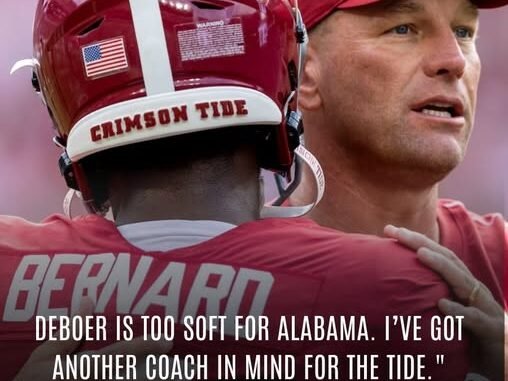
The Alabama Identity Crisis: Stephen A. Smith’s Explosive Take on Kalen DeBoer and the Tide’s “Finesse” Future
In the world of sports commentary, no voice is more polarizing, or more powerful, than that of Stephen A. Smith. His unfiltered opinions, delivered with a trademark blend of bravado and conviction, have the power to ignite a firestorm of debate and to stir the pot in even the most sacred of sports territories. For the Alabama Crimson Tide, a program built on a foundation of grit, toughness, and an unyielding commitment to dominance, Smith’s recent commentary was a direct and devastating hit. In a fiery on-air segment, he not only called head coach Kalen DeBoer “soft” but also hinted that he would have preferred a different coach for the program—a legendary voice in a new, unproven body.
Smith’s commentary, which was delivered on his popular show First Take, was a direct and unflinching critique of the new direction of the Alabama football program. He stated, in no uncertain terms, that the team was “considerably softer” under DeBoer than it was under the legendary Nick Saban. He acknowledged DeBoer’s impressive resume, his national championship appearance at Washington, and his record of success at multiple levels of college football. But for Smith, none of that mattered. What mattered was the “meat and potatoes” of Alabama football—the physicality, the toughness, and the an unyielding commitment to a hard-nosed, ground-and-pound style of play.
The “soft” label, a term that is often thrown around in the world of sports, is a particularly damning one for a program that has long been the gold standard of toughness. For decades, the Alabama Crimson Tide was a team that could out-muscle, out-physical, and out-hit any opponent. Under Nick Saban, the team was a disciplined, relentless force that wore down its opponents with an unyielding defense and a powerful running game. DeBoer’s offensive philosophy, which is based on an up-tempo, free-flowing, and pass-heavy attack, is a stark departure from that tradition.
Smith’s critique is not just a passing observation; it is a profound philosophical indictment of the new direction of the program. He believes that for a program with the resources of Alabama, a “finesse” style of play is not only a bad fit but a fatal flaw. He stated that he would have preferred to see the program hire a different coach, a coach who embodies the toughness and the relentless drive that has long been the hallmark of Alabama football. He didn’t just hint at it; he came right out and said it: he would have preferred to see Deion Sanders, the head coach of the Colorado Buffaloes, take over the program.
The suggestion, which was as wild as it was provocative, was a clear and powerful sign of Smith’s frustration with the new era of Alabama football. He believes that Sanders, with his charisma, his recruiting prowess, and his ability to inject new life into a program, would have been a “spectacular” hire for the Crimson Tide. The fact that he would even consider a coach who, at the time of the comments, had a far less impressive resume than DeBoer speaks to the depth of his frustration. For Smith, a program like Alabama needs a figure who is not just a coach but a cultural icon, a leader who can command respect and who can ignite a fanbase with his energy and his personality.
While many in the Alabama faithful will likely dismiss Smith’s comments as an over-the-top, media-fueled rant, a closer look at the situation reveals that there is a kernel of truth to his critique. The team’s struggles in the 2024 season were a clear sign that the transition from the Saban era to the DeBoer era was not going to be a seamless one. The team’s 9-4 record, while impressive for most programs, was a major disappointment for a fan base that has grown accustomed to a level of excellence that is unmatched in college football. The team’s struggles on the defensive side of the ball, in particular, were a cause for concern. The defense, which was once the most feared in the nation, struggled to stop the run and was often out-physicaled at the point of attack.
The pressure on Kalen DeBoer is immense. He is not just a coach; he is the man who is tasked with following in the footsteps of the greatest coach of all time. He is a man who is being judged not by his wins and losses but by his ability to maintain the standard of excellence that has been set for decades. Stephen A. Smith’s commentary, while perhaps over-the-top, is a clear and powerful sign that the scrutiny on DeBoer will only continue to intensify. For the Alabama Crimson Tide, the challenge is not just to win games; it is to win them in a way that is consistent with the program’s long-standing identity. The question for DeBoer and his team is a simple one: are they “soft” or are they simply in a new era of Alabama football? The answer, for the fans, for the critics, and for Stephen A. Smith, will be found on the field this season.
Leave a Reply